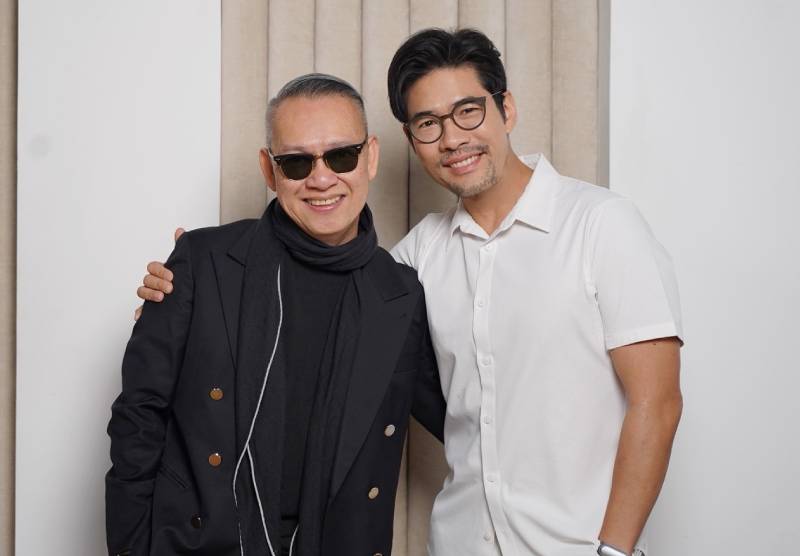Revealing the secret behind the energy mutation of Aunt Tue Sombatsorn, a 63-year-old online idol who lives through every era! Still enjoying work and life, she talks about adapting and understanding generational differences, how she was once seen as strong, and how social changes have made direct communication more acceptable. She also offers a course on how to live with every generation, from Baby Boomers to Gen Z, adapting to situations and groups of friends to create happiness and be a harmonious part of the group, on the WOODY FM program.
People may still be wondering, how old is Aunt Tue?
Aunt Tue: 63, for me, doesn’t feel like I’m 63. I’m telling the truth. If people don’t ask about my age, I won’t feel like the number 63 is floating around.
The energy has changed. From people not daring to approach and people being afraid, it has become that many people approach, especially children. What happened to Auntie?
Aunt Tue: The kids probably wouldn’t be scared. They’d probably be afraid. If we weren’t talking, we’d be the most calm. I think because of our overall calmness, sometimes our body language moves little. If we were still, our body language wouldn’t say anything at all, and people wouldn’t be able to tell. Plus, with sunglasses on, and the way we were thinking, we weren’t focused on our surroundings. It’s possible that the people around us would feel like, “Don’t mess with this person. Maybe something’s going on inside of them that could make them go, ‘BOOM!'” But in reality, there was nothing. My mind was completely blank.
When it comes to connecting with people, do you see yourself needing to adjust anything?
Aunt Tue: Actually, I’ve been connecting with people since childhood. But our connection may have come at the wrong time. I’m a straightforward person, a person who speaks the truth, and a person who doesn’t lie to others. You have to admit, there was a time when people couldn’t listen to the truth. But this is not the case today. This era is an era where people can listen to the truth and debate with each other. This has reduced the gap in people. In the past, I was straightforward, clear, and said what I wanted to say to the point, quickly, and concisely, without waiting. People might feel that this person is aggressive, but in reality, it’s not. I’m telling the truth. That’s all I want. But you don’t understand what I’m communicating to her.
So why was it that in the past, direct and concise energy was not accepted by society, and now it seems to be more acceptable? Why?
Aunt Tue: There are more people like this in the world who speak clearly, to the point, and repeatedly. Sigmund Freud said that after 16 times, the 17th time, a bitter thing becomes sweet. So there are more than 16 people like this in the world. I believe in Sigmund Freud’s theory, and it’s the same with us. Let’s adapt. What we say, sometimes we say it clearly, directly, and loudly because we’re hard of hearing. But actually, we learn one thing: if some people are this type of person, we have to have a way of speaking clearly and directly with them. It has to be Tailor-Made in speaking again.
So in the past, it was open and loud, meaning it could be distributed directly, not tailor-made?
Aunt Tue: It’s spoken directly through the microphone. Who could control the microphone and speakers in the past? But these days, it might be because we live together with many different types of people. Now, our friends aren’t always the same level. We have friends who are older, younger, and even children. There are people in their 20s and 10s. We have to live together with them. The language we use or the way we live together has to be tailor-made for each group, truly different. But it’s not fake. It’s just our way. If we live with this group and we’re all the same, we won’t have any friends. This is something we’ve learned.
So, when it comes to tailor-made communication, from Baby Boomers to Gen Z, Gen X, Gen Y, and Alpha, how do each group communicate? How are their methods different?
Aunt Tue: Let’s say we have a group of friends who are Baby Boomers. Our group of friends will know right away that one thing we’ll stick with them for is not talking about aging. We won’t talk about the drama of their lives. We’ll talk about daily happiness, the remaining happiness, being happy every day, doing one good deed a day. And then we’ll talk like this, and enjoy eating, traveling, living life together. And we’ll talk about funny things from the past. We won’t talk about the past that were traumatic. We’ll say that there’s something new that’s happened and let’s share it. We won’t talk about toxic things, we won’t gossip, we’ll create an environment with this group of friends, because this group is all over 60. And we won’t talk about death. We already know where the tunnel ends. But we’ll gather happiness along the way. For me, this group of friends, we choose not to talk about their parents’ illnesses, their family members’ illnesses, or their family finances. Because we believe that sometimes these things shouldn’t be shared completely. They should be listened to and not have a solution for them. But we’ll tell them what they think they want to do. I trust their decision. It’s empowering and encouraging for this group of friends.
Generation X group
Aunt Tue: Group X. For me, this group, what I talk to them about, I think they’re a relatively strong group, already established, well-off, and financially stable. I don’t talk about these things at all. I talk about things like, “Hey, let’s go find something new to do,” like, “Let’s do something we’ve never done before, and why?” Because these people are already secure. Therefore, they want to experience new things. Most recently, I went to a Khao San bar. Everyone screamed. Everyone was happy that there was such a world. Everyone was happy to go on a trip or take them to eat at a food stall. Usually, they go to Michelin-starred restaurants, but we told them, “This is really delicious, let’s go eat.” We emphasize eating, traveling, and enjoying.
Generation Y group
Aunt Tue: This one, for me, is a group that I think is starting to want stability in life. I feel like if we act like a teacher or an older sibling, they won’t want to talk to us right away. We need to be friends. And we feel that being friends means that if they ask, we’ll answer. We won’t say, “You have to do this or that.” Don’t act like their mother or older sibling. If we act like that, they’ll get annoyed because they’re already figuring things out in life. But we just say, “What are you doing?” “Okay, give me this, I’ll help you,” and so on. We’ll have a way to support them, “Here, I’ll help you with this. I have this person. I’ll introduce you to this person.” We’ll mix this generation’s connections with this generation, and bring them together. But this group of people must love going out at night. I have to be able to party with them. But not every day, not once a week or once every two weeks, as late as 5 AM.
Generation Z group
Aunt Tue: We won’t try to infiltrate Gen Z. We’ll use them as teachers for everything. If you want to know something, ask them, and then brainstorm with them and say, “Hey, what’s this? You’re like this.” Treat them like friends, like close friends, and learn from this. These people teach us a lot. They see things we don’t see, and say things we don’t. But when we talk to them, they become teachers. I use them as teachers. Whether it’s social media, eating, or lifestyle, Gen Z doesn’t eat like us. We eat food that they grew up eating, like 7-8 different dishes on the table. But they eat food that’s individual and comforting, simple, and not complicated. Whatever you want to eat is your business. When you get there, you just order it and sit on the floor and eat.
Or some people would go sit and eat on the balcony and then go sit and talk on the balcony. There’s no sitting like people of our generation would sit and watch TV, then watch a beauty pageant recap. It’s very free. But one thing is, we won’t ask them, like, “Why did you have to do this or that?” “Why?” It’s absolutely forbidden. If Gen Z asks “Why?”, they’ll immediately feel like we’re acting suspicious and starting to get annoyed. When they go to someone’s house, they have to prepare their own things. They manage their own lifestyle. If friends want to join, they can join, but they have to bring their own things. They don’t ask why they’re dressed this way or who’s wearing pajamas. Meanwhile, another friend comes down wearing an evening gown, and no one asks questions. It’s a mix. Whoever wants to do whatever, they really do it. They want to do whatever they want, and we don’t care about our friends.
What about the energy of the comb-carrying gang? Because I’m very close to them, what did I learn from them?
Aunt Tue: Our energy when we’re with him, we become like his mother, a single mother who has to live together like a friend. He calls us “mom.” We’re the kind of mother who can talk to him about everything, eat everything with him, go everywhere with him, and go out with him. But at the same time, whatever he wants to do, we’re completely open. We can be together without having to say, “Hey, mom, today you’re here, you have to tidy the house. Don’t come and lie on the sofa today, I’ll lie on the sofa and do everything like him.” The only request is, “Can I wear socks in the house? I’m someone who never takes off my shoes. That’s all I ask.” Everything else is blended in. When we eat, we don’t have to worry about sitting down and having our children serve us. We don’t have to serve ourselves. We have to learn how to live with people. We’re very happy. Thank you to them. Thank you so much for making me happy at this time.”
To be honest, whenever I’m in a group, I never think about being a lead. Sometimes I just go as an extra to support them. I always think that way, and it’s not necessary. Back then, when we were kids, we might have had a mindset of “I’m not your extra.” But today, with society and the world changing so rapidly, everything has changed. We have to evolve. We need to be in a place where we’re happy and contented, not where others put us down. We’re in a place where we’re content. At this moment, every group has its own moment. During this time, we have to act like an extra. In this moment, we have to be the leader. Or in this moment, we might just be a silent listener and become the “3” or “4”. It all depends on the moment of each group.





